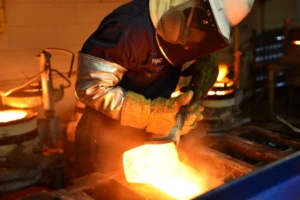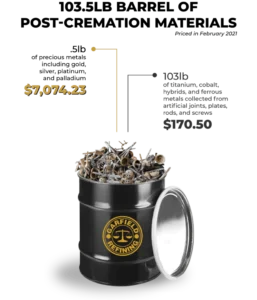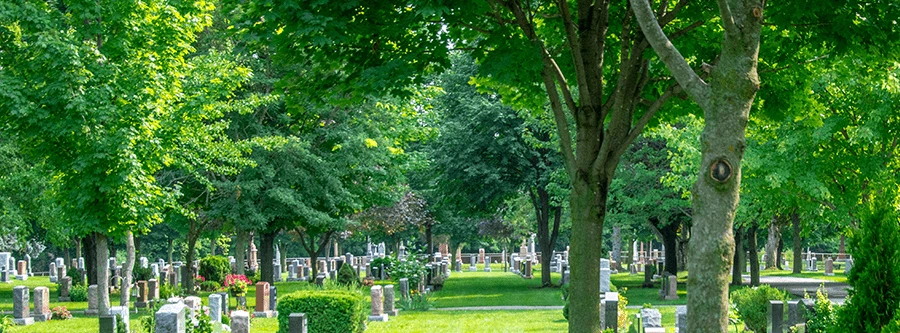Many people may not know that post-cremation metal recycling exists, let alone generates revenue that can be used to benefit communities. The process involves recovering metals like gold, silver, platinum, and palladium, commonly found in implants such as pacemakers, defibrillators, artificial joints, metal plates, and dental work. As cremation rates have risen in the past few decades, so too has post-cremation metal recycling and the value it generates. Beyond being eco-friendly, this practice serves as a meaningful way to give back to society.
This raises an important question: what should be done with the income generated from post-cremation metal recycling? Many crematories and funeral homes choose to direct these funds toward charitable donations, a trend that has significantly benefitted communities worldwide.

The Rise of Post-Cremation Recycling
Professionals in the death care industry, such as funeral homes and crematories, are known for their sensitivity to the needs of those they serve. Their role naturally extends beyond providing support during one of life’s most challenging moments; many also find ways to give back to their communities.
About 20 years ago, post-cremation metal recycling began gaining traction as an innovative solution for crematories. Previously, metals remaining after cremations were often buried in cemetery grounds, sent to landfills, or stored in vaults.
Recognizing the environmental and ethical implications of these practices, the industry pivoted toward recycling – a more sustainable and socially responsible alternative.
An Eco-Friendly Shift
Environmental concerns have been a key driver behind the adoption of post-cremation metal recycling.
Disposing of metals in landfills or burial grounds can harm ecosystems. For instance, metals like silver can leach into the soil and water, posing risks to wildlife and marine life.
Moreover, recycling post-cremation metals reduces the need for mining new materials. Mining precious metals like gold and palladium is resource-intensive, contributing to carbon emissions and habitat destruction. By recycling these materials, crematories play a small but vital role in preserving the planet.

Metals as a Force for Good
The recovered metals from cremation hold substantial value. For example, a 2021 transaction at Garfield Refining processed 103.5 pounds of post-cremation metals. Among these, about half a pound of precious metals alone was worth $7,074.23. The remaining metals – titanium, cobalt, and ferrous alloys – accounted for 103 pounds and were valued at $170.50.
While some crematories use the revenue from recycling for operational improvements, many dedicate these funds entirely to charitable causes. At Garfield Refining, we proudly work with crematory partners who donate all proceeds to charities. Following their example, we’ve made significant funds to nonprofits such as Shriners Hospitals for Children and the Children’s Hospital of Philadelphia (CHOP) in our home city of Philadelphia.
Global Contributions from Post-Cremation Recycling
The practice of donating proceeds from metal recycling isn’t limited to the United States—it’s a global movement.
- United Kingdom: In Stafford County, England, crematoriums raised over £120,000 for charities in 2024 alone.
- Sweden: Known for its eco-conscious policies, Swedish crematories frequently donate recycling proceeds to charities focused on healthcare and social welfare.
- Australia: Australian crematories often direct funds to local causes. For example, the Metropolitan Cemeteries Board has partnered with the Cancer Council WA, donating over $1.8 million from recycling funds to provide critical support for regional cancer patients.
Opportunities for Charitable Giving
There’s no shortage of organizations that crematories and funeral homes can support through metal recycling funds. Beneficiaries often include:
- Medical research foundations for terminal illnesses
- Homeless shelters and food banks
- Suicide prevention organizations
- Hospice care and palliative support programs
- Veterans’ organizations
- Local police, firefighter, and emergency medical technician (EMT) funds
Connection Through Giving
For many in the death care industry, recycling isn’t just about environmental responsibility—it’s an opportunity to connect deeply with their communities and contribute to meaningful causes.
Post-cremation metal recycling represents a win-win for communities and the environment. By recovering valuable materials, crematories can reduce waste, mitigate environmental harm, and create funds that support charitable initiatives. This practice exemplifies how the death care industry can turn something often overlooked into a source of hope, healing, and generosity.
If you’d like to learn more about Garfield Refining’s efforts in post-cremation recycling and our contributions to nonprofits, contact us today. Together we can make a difference, one recycled metal at a time.

